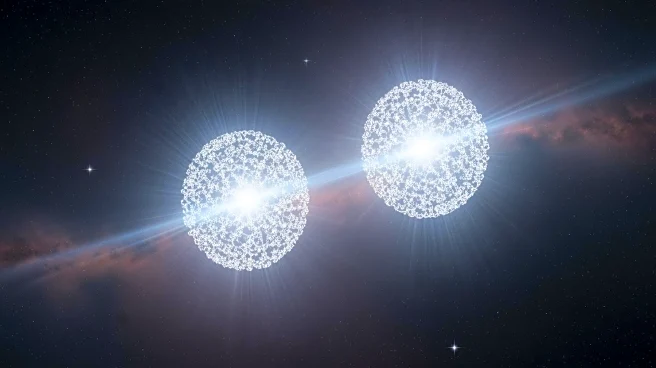What's Happening?
Polish physicists have revealed that quantum nonlocality, a fundamental aspect of quantum mechanics, can be observed in identical particles. This discovery stems from the indistinguishability of particles like
photons and electrons, which are entangled across vast distances. The research, conducted by theorists from the Institute of Nuclear Physics of the Polish Academy of Sciences and the Institute of Theoretical and Applied Informatics, shows that nonlocality is inherent in the nature of identical particles. The study builds on John Bell's concept of nonlocality, which challenges the traditional understanding of cause and effect in quantum systems. The findings suggest that nonlocality is not just a by-product of experimental interactions but a fundamental characteristic of the universe.
Why It's Important?
This breakthrough has significant implications for quantum mechanics and the understanding of entanglement. By demonstrating that nonlocality is inherent in identical particles, the research opens new avenues for exploring quantum systems and their applications. It challenges existing frameworks and suggests that entanglement and nonlocality could be more accessible than previously thought. This could impact fields such as quantum computing and quantum communication, where harnessing nonlocality could lead to advancements in technology and information processing. The study also raises philosophical questions about the nature of reality and the interpretation of quantum mechanics, potentially influencing future research directions.
What's Next?
The research sets the stage for further experimental investigations into the nonlocality of identical particles. Scientists may explore new optical configurations and quantum states to better understand and utilize this phenomenon. The findings could lead to practical applications in quantum technologies, such as developing more efficient quantum computers and secure communication systems. Additionally, the study may inspire theoretical work to refine the understanding of quantum mechanics and the role of nonlocality in the universe. As researchers continue to probe the mysteries of quantum physics, this discovery could be a stepping stone to uncovering deeper insights into the fabric of reality.
Beyond the Headlines
The implications of this research extend beyond immediate technological applications. It touches on ethical and philosophical dimensions, questioning the nature of identity and individuality in quantum systems. The indistinguishability of particles challenges conventional notions of separateness and individuality, suggesting a more interconnected universe. This perspective could influence cultural and philosophical discussions about the nature of existence and the interconnectedness of all things. As quantum mechanics continues to evolve, these broader implications may shape how society understands and interacts with the world.









